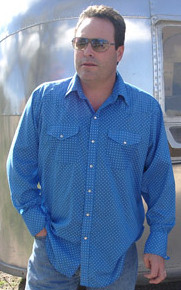An Interview with Mark Stuart of Bastard Sons of Johnny Cash
 Mark Stuart has only himself to blame. The name was his idea – even if he didn’t mean it to stick – and the stories associated with it are good ones.
Mark Stuart has only himself to blame. The name was his idea – even if he didn’t mean it to stick – and the stories associated with it are good ones.
But Stuart is considering hanging up Bastard Sons of Johnny Cash as a band name when he moves to Austin, Texas, from San Diego next year.
“I think now that he’s gone … it means less,” Stuart said of Cash’s 2003 passing. “And I think there was a certain knee-jerk reaction to the name … . [And] to be quite honest, I just get tired of answering questions about Johnny Cash.”
This statement comes, of course, after he’s patiently answered a series of questions about Johnny Cash.
Stuart doesn’t plan to quit writing or performing his unapologetic country music, but Johnny Cash could well get the ax. The next time you see Stuart, he could be fronting Mark Stuart & the Bastard Sons.
As great a conversation-starter as Johnny Cash is, that switch would probably be for the best. While the “outlaw country” music of Cash, Kris Kristofferson, and Waylon Jennings clearly informs the Bastard Sons, you can also hear the strong influence of Lyle Lovett in the ache of Stuart’s singing, his clean, full arrangements, and his lack of musical irony.
Stuart said that many people expect sneering, tattooed rockers from the Bastard Sons – “Social Distortion meets Hank III. … ‘We thought [with] the name, you guys would be some shitty punk band.'” What they get is earnest, beautifully rendered, occasionally raucous country.
Stuart was in a punk band, and some rock bands, too. But he wasn’t sure what he wanted to do musically when, in 1993 or 1994, Cash began to appear to him in dreams.
Some people see Jesus. Stuart got Cash. And the best part? Cash didn’t give him pointers in the dreams; he was looking for feedback.
“I’d be standing in line with all the other people [after a show], and when I’d get up to the front of the line, he goes, ‘Hey, I want to show you a new song,’ or ‘It’s funny you’re here, because I want to play this for you and see what you think,'” Stuart said. “I never remembered one single song he ever played me, but I think somehow it influenced me.
“I definitely had the feeling that I was being pointed in a direction. I was sort of between musical things. My early punk thing had floundered, and two or three attempts at rock bands had floundered, and I was sort of looking for a musical direction, sort of like a signpost or something to point if I was on the right direction or whether I should give up music entirely or get a straight job.”
At about the same time, Stuart saw improvement in his songwriting in the Americana vein, and he started a trio to play around his native San Diego. “Bastard Sons of Johnny Cash” sounded right.
When he had enough material that he wanted to record, he decided to see if Cash would sign off on the name. In the late 1990s, Stuart talked to Cash by phone and, finally, in person after a show. It was a fulfillment of his dreams and also a fitting validation of the name: “He gave me just an encouraging sort of father-son pep talk. … Basically it was sort of a ‘Stick to your guns, kid’ speech.”
The band debuted with Walk Alone in 2000, followed by Distance Between in 2002, and last year it released Mile Markers. Stuart said he was striving for a Southwestern sound on the latest recording, “between the Mavericks and Dwight Yoakam and Steve Earle.” Stuart’s band also has a new DVD that was filmed during a spring European tour.
He said he hopes to be in the studio early next year and has plenty of material with which to work. “Ever since the time of those dreams, the writing has been very prolific,” he said, “and I’m usually a couple albums ahead of myself.”
As for the move to Austin, Stuart doesn’t have any delusions that the musical hotbed will turn him into a superstar. “I expect cheaper rent,” he said, completely serious. “That’s all I expect. … [And] a closer access to our touring markets. … And hopefully some better bass fishing.”
This article was originally published in slightly different form in the River Cities’ Reader.

